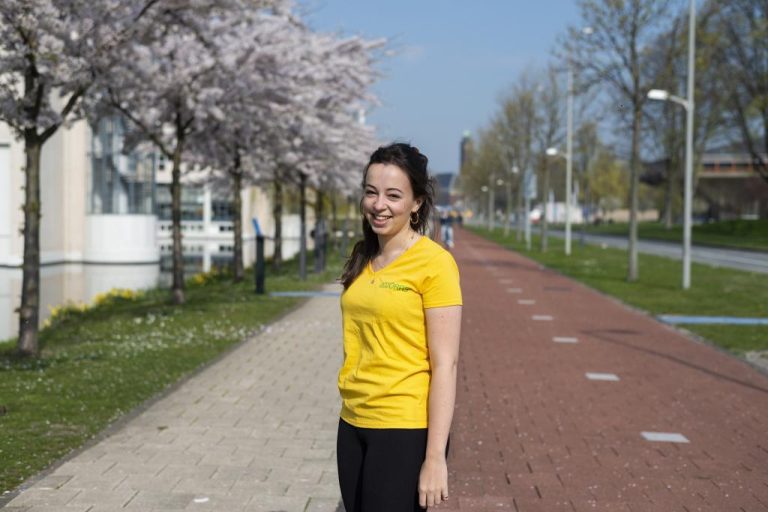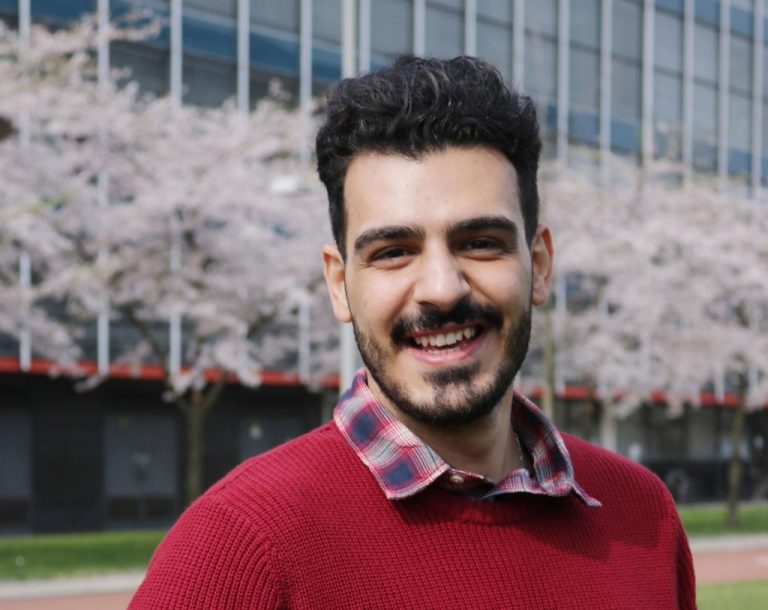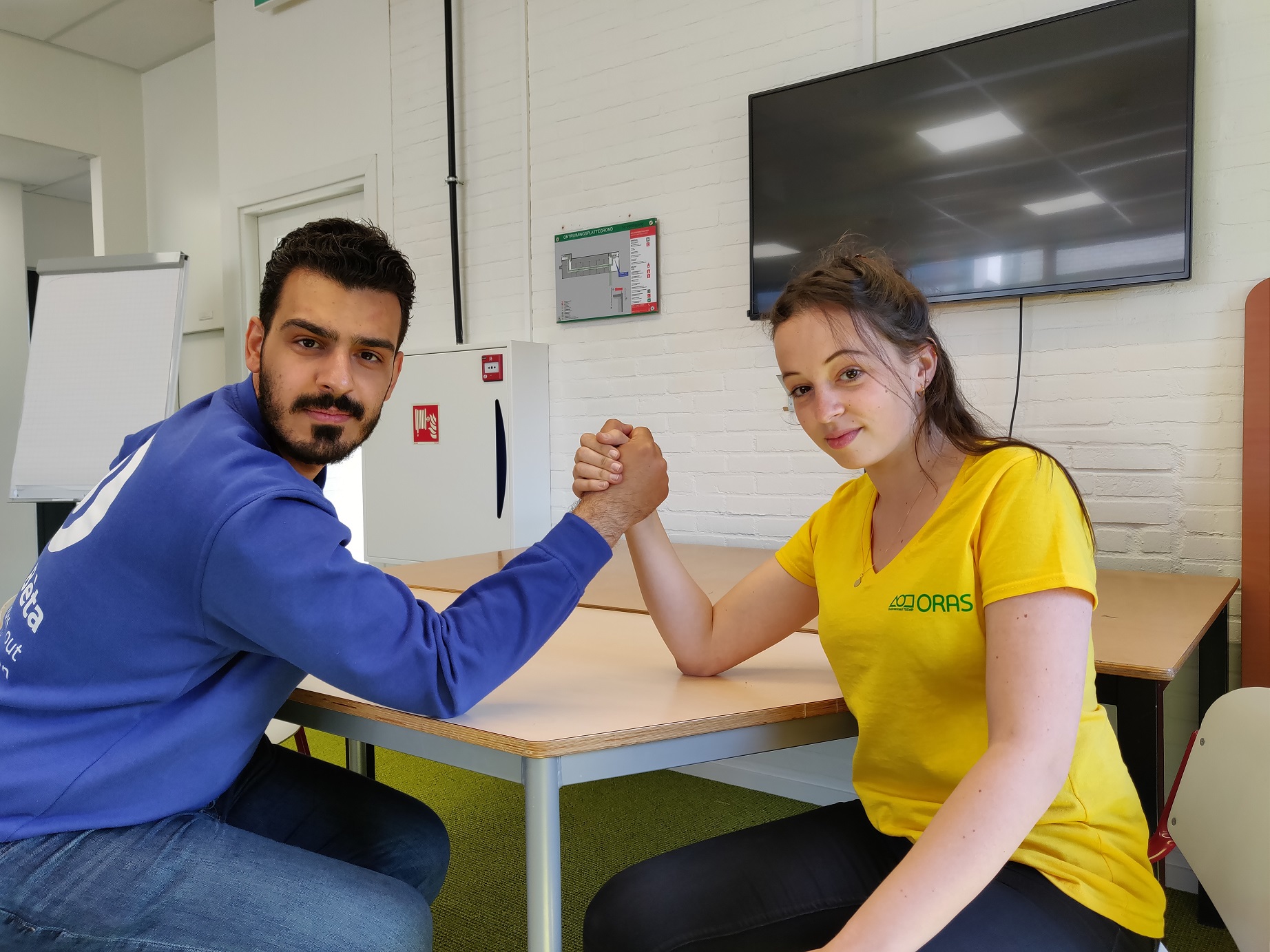More study places or more student psychologists? In the run-up to the elections on May 21 and 22, Delta spoke with Oras and Lijst Bèta about pressing issues at TU Delft.
In the run-up to the elections Delta spoke with top candidates Yasmine Ouibrahim (Oras) and Nima Salami (Lijst Bèta) about themes like sustainability, student welfare and intake control. (Photo: Marjolein van der Veldt)
The Student Council elections are scheduled just before the European Parliament elections. We spoke to the top candidates Yasmine Ouibrahim (Oras) and Nima Salami (Lijst Bèta) about themes like sustainability, student welfare and intake control.
 Yasmine Ouibrahim. (Foto: Maartje Rempt)
Yasmine Ouibrahim. (Foto: Maartje Rempt)
Who is Yasmine Ouibrahim?
“I am a second-year engineering student originally from The Hague. At the student union Stylos I am on the committee organising the freshers’ weekend this year and the coco, for all active members. I am also the chair of the faculty Student Council for Engineering, which is concerned with educational matters. Furthermore, I train at X.”
Why are you the top candidate for Oras?
“I fully support the vision of Oras: there must be more than good education offered, the right facilities and the possibility to do additional things alongside your study are also important. I certainly take advantage of other possibilities and enjoy doing them immensely. I have learned so much by being on the faculty Student Council, and I want to continue developing this on a larger scale.”

Nima Salami. (Photo: Lijst Bèta)
Who is Nima Salami?
“I am 25, third-year student of computer science and engineering and came to the Netherlands 4.5 years ago. Along with studying, I am also an entrepreneur and am passionate about photography and film. From my background, I have learned to give back to the society I live in. Lijst Bèta gives me the opportunity to work on behalf of other students and make a contribution to TU Delft.”
Why are you the top candidate for Lijst Bèta?
“As an international student, I had a tough time in the beginning. David Allaart, who is now a fraction officer, helped me back then. I discovered that we share many of the same core values and saw up close how special it is to be able to express these values in the Student Council.”
More Delft engineers or more numerus clausus?
Yasmine Ouibrahim: “More Delft engineers! A numerus clausus is a stopgap solution because otherwise the number of students would explode. It is a good solution because you are evaluated by a project, not just the numbers. I say ‘more engineers’ because the programmes here are fantastic.”
Nima Salami: “The demand for engineers is certainly increasing, but on the other hand we also want the engineers whom we train to be capable. As a student of computer science and engineering, I know all too well how the number of students is exploding, but I consider a numerus clausus primarily as a stopgap solution. If I really have to choose: more Delft engineers.”
TU Delft is too attractive to international students.
Ouibrahim: “I definitely believe that TU Delft is an attractive university. We have a great reputation and many possibilities. We must not prevent people from studying here, but there must be a good balance between Dutch and international students. There must be enough space for Dutch students.”
Salami: “As an international student, I can only say that TU Delft has a good reputation. We offer high-quality education in a place where internationals feel welcome. Our university may be attractive indeed in some cases, as proven by the explosive growth in my programme for example.”
What takes priority: more study places or more student psychologists?
Ouibrahim: “Difficult question… If there are more study places, you can study more when it suits you best, and we are busy trying to achieve that. Last year, we ensured that an additional student psychologist was appointed, but there are still long waiting lists. I think that I would choose student welfare and thus more psychologists.”
Salami: “Wow, what a complex contention! There is clearly a shortage of study places, but we are also seeing an increase in the number of students needing psychological support. Although we must certainly not ignore this, I would choose more study places. Students who need psychological support can in the worst case contact the regional mental healthcare service, but study places are part of the education and must simply be available. ”
More money for development like volunteering, or more money for making the campus sustainable?
Ouibrahim: “Another difficult question. The recognition of development is especially important. We would like to see tuition fees waived for student board members, for example, because they are developing themselves. Oras has contributed ideas to a plan for an energy-neutral campus in 2030, but we also deeply support development. Sustainability does not have a high priority for us at this moment.”
Salami: “We are a sustainability conscious party and that’s why we believe it should be part of the curriculum and also be practiced on campus. From that viewpoint, we are conducting a minimal waste campaign this year. In that way, we contribute a little bit to making our campus more sustainable. Climate change is a problem of our generation, and it is up to us to solve that problem.”
How does your party differ from the other one?
Ouibrahim: “Oras stands for good education with the right facilities. That means not only study places, but good 1-on-1 contact with your lecturer and the possibility to develop yourself, like volunteering, sports training whenever you have time, and possibilities to go abroad or do an honours programme. That is where we distinguish ourselves from Lijst Bèta.”
Salami: “Ultimately, we shall sit together on the Student Council and exert ourselves on behalf of all students, but there are certainly differences compared with Oras. Lijst Bèta is a young and flexible party that focusses primarily on the more modern problems and needs of students. In addition, we are very open to international students, and thus all of our internal meetings are held in English. Besides that, we also made it possible that our meetings, including written notes, with the board are now in English as well.”
If you are selected, what is the first issue you will tackle?
Ouibrahim: “We are already working on several topics, like the findability tool. You can view all the study places in the university with it. In September the first version will be made public. We are now busy ensuring you can see the real time occupancy. I really want that to go through.”
Salami: “I have many ambitions, but what I would like to take care of first is that internationals feel more involved. I hope to find a way to promote the integration of international and Dutch students.”
- The voting will be online. From Tuesday 21 May 2019 8:00 a.m. until Wednesday 22 May 2019 5:00 p.m. you can vote via: https://stem.tudelft.nl
By Connie van Uffelen en Marjolein van der Veldt
Do you have a question or comment about this article?
m.vanderveldt@tudelft.nl


Comments are closed.